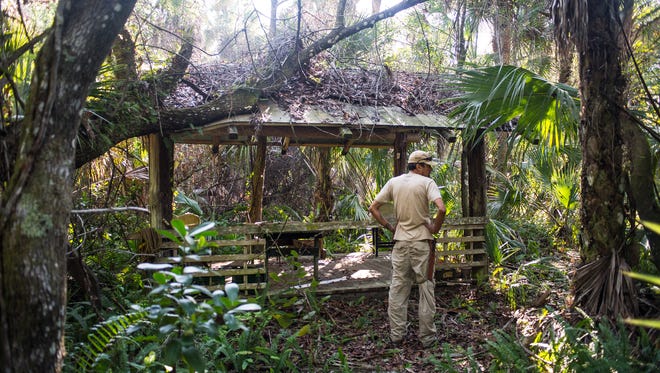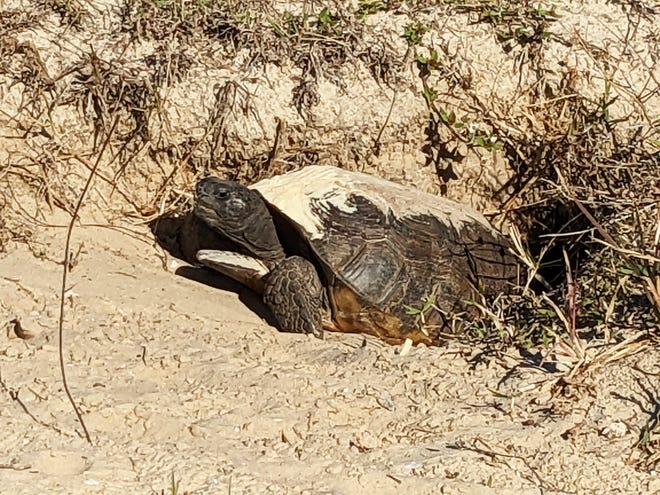Telling voters no: Commissioners formalize 'right' to divert Conservation Collier money
 Laura Layden
Laura Layden
Collier commissioners have formalized their right to use taxpayer money collected for land conservation for other purposes.
On Tuesday, the board adopted changes to the county ordinance governing Conservation Collier, giving itself the "express power" to use the program's money for "any other county purpose deemed to be in the best interest of the public," if there's a majority vote to do so.
Commissioners voted 4-1 in favor of the changes, despite opposition from environmentalists and other supporters of the popular program. Burt Saunders cast the lone no vote.
The decision came a few weeks after commissioners decided at a budget hearing to redirect money from Conservation Collier to the county's operating budgets, to completely offset tax cuts this year. Only Saunders objected, saying he found nothing "appealing" about the proposal.
At the time, County Attorney Jeffrey Klatzkow told the board it had the legal authority to transfer money out of the program's two funds and spend it elsewhere based on its broad budget powers, although it comes from a self-imposed tax approved by voters in a referendum, exclusively for land conservation and maintenance.
The changes to the ordinance make the right to transfer funds out of the program an "explicit power," through express language stating so, and puts the public on notice of that right, he said.
In addition to voting against the ordinance changes, Saunders sought a commitment from his fellow commissioners not to do the same thing to Conservation Collier next year. While the other commissioners wouldn't go that far, they all stated they saw the action they took as a temporary fix, hoped not to repeat it and wanted to see the money restored as soon as possible.
While the program may not be as healthy as it could be, if it weren't for the transfer of the funds, it is "certainly in good shape," with money still available to both acquire and maintain conservation lands, said Commissioner Bill McDaniel.
"The rational that we are gutting Conservation Collier doesn't hold weight with me," he said, in response to critics.
McDaniel is the one who proposed the idea of transferring money from the program's funds to deal with general budget shortfalls, stemming from the board's late-hour decision not to raise taxes this year, made at a marathon hearing.
The budgeted transfers from the program's two trust funds total more than $53.5 million.
In case you missed it:Collier board votes to roll back property rates, and cut money for Conservation Collier
More:Conservation Collier could see budget cuts next year. Here's why
County to continue acquiring conservation land
Chris Johnson, a budget analyst with the county's office of financial and management services, told the board that even after the transfer $37 million has been budgeted for Conservation Collier this year, $26.9 million for acquisitions and $10.1 million for maintenance.
Elaborating further, Jaime Cook, the county's director of development review under the county's Growth Management Department, which oversees the program, explained that on average Conservation Collier makes $5 million in acquisitions and spends $1.4 million on maintenance a year, far less than the amount that's still available to it.
At that rate of spending, McDaniel figured the program could subsist on what's left in its accounts for five years, but he expressed the desire to pay the money back and to fully fund it as quickly as possible.
As part of the budget cuts, the board also trimmed the millage (tax rate) for Conservation Collier from 0.25 to 0.2242, reducing its expected revenue by more than $3.57 million this year.
A few years ago, voters approved the renewal of the program, which allowed for a tax levy of 0.25 mills a year, for another 10 years. A mill is equal to one dollar for every $1,000 in taxable property value.
For fiscal 2024, commissioners reduced the county's aggregate tax rate to about 4 mills, down from more than 4.43 mills last year.
While the argument can be made that Conservation Collier has sufficient money to operate this year, if funding is not fully restored next year, it could be in "jeopardy," and no longer seen as an active program, Saunders argued.
Some commissioners seemed more willing than others to commit to full funding next year, but several raised concerns about not knowing enough about what's in store.
Commissioner Dan Kowal said it's hard to predict what will happen in the housing market, which will heavily influence property values and tax collections in 2025.
"We don't know at this point," he remarked.
He continued to defend the board's decision to tap Conservation Collier money to cover other budget shortfalls and to characterize those who criticized the move as selfish, when the program had an overabundance of money in reserves, and the county couldn't even find enough money to buy bathing suits for lifeguards at its pools.
He expressed that he felt insulted by those who accused the county of "raping" Conservation Collier's funds, and shutting down the program, which the board clearly supports.

Kowal pointed out that some of the program's money has been transferred into the county's emergency reserves, much of which were depleted in the aftermath of Hurricane Ian last year – and have yet to be reimbursed by the Federal Emergency Management Agency.
"We are not out of hurricane season yet," he stressed.
Earlier in the meeting, the board approved more purchases, and a new list of acquisitions for county staff to pursue in the latest cycle of the willing seller program, which has been in existence since 2003.
Commissioners hope to improve Conservation Collier
Commissioners have criticized the program for not working fast enough and have vowed to work with county staff to improve it, so that it can operate more swiftly and wisely. They have floated a few ideas of their own, including the potential to buy easements, rather than owning the land outright, in some cases, to save money and time.
In defense of the board's actions, chairman Rick LoCastro said: "I don't think we are raiding anything."
Rather, he said, the board is trying to do its job, and to do a better job of managing the program and the county's budget. He pointed out that commissioners have given themselves a lot of "homework assignments," to find ways for the county to operate more efficiently, and effectively, by doing a deep dive into the entire budget. The county plans to hire a consultant, or two, to help out in that effort.

Some who support Conservation Collier have been "flabbergasted" to discover just how much money it has in reserves, through the board's scrutiny of it, and have expressed they are OK with the transfer of funds, as the county looks to improve upon it, LoCastro said.
"Not everybody thinks it's a black and white thing," he said.
If county commissioners succeed in their efforts to trim the waste out of the county's $2.85 billion budget, LoCastro said they shouldn't have to dip into Conservation Collier's funds next year, and should be able to fully fund it, getting it rolling in a way that everyone can be proud of moving forward.
"We fully believe in it," he said. "We are behind it."
While there have been accusations that what the board did to the program is illegal, unethical and immoral, LoCastro insisted it's not, with a nod of approval from the county attorney.
"It may have been unique and unexpected," he said. "It's not lost on us what we did do, and we still have yet to do, to continue to do the job that we have to do going forward."
Not a 'slush fund': Some balk at raiding voter-approved conservation money
During the hearing, several Conservation Collier supporters spoke against making changes to the ordinance, asking the board to reconsider its earlier decisions to cut back on funding, even if it's just for a year. That included Brad Cornell, a policy associate for Audubon Western Everglades and Audubon Florida in Southwest Florida.
He argued the county won't even have enough money for the acquisitions that are coming to it this year, and that sweeping money from the maintenance fund threatens the long-term management of the lands the county has already acquired.
Without responsible annual management, he said environmental resources will degrade, posing fire, flooding and exotic infestation risks to nearby residents.
Additionally, he pointed out the management fund has served as a de facto reserve fund for hurricane recovery in the past, giving it another important purpose, in times of need. It has been reimbursed.
The program has about $20 million of pending contracts, likely and possible acquisitions in process, with more deals sure to surface over the next year, he said.

In fact, the owners of a 2,200-acre property in Immokalee that includes a large part of the big wetland slough that is a tributary to Lake Trafford is "very interested" in selling its land for conservation, and the expected price of that one is between $20 and $23 million, Cornell said.
Several residents and community activists challenged the legal right to use the Conservation Collier money for other purposes, and to change the ordinance retroactively, with that goal in mind.
Carson McEachern, a local attorney, asserted that the "special ordinance" governing the program could only be changed by a countywide referendum. Since a referendum is what led to the creation of the program.
He asserted the funds are segregated for a purpose and must be used for that purpose, describing the limitations on the money as "black and white."
To allow the "raiding" of the funds goes against the purpose of creating the program, in the first place, because without the money it can't function, he reasoned.
Diane Preston Moore, president of the Collier County League of Women Voters, accused the board of breaching the principles of good government, and disregarding the will of the voters, who have overwhelming approved the program in three different referendums since 2002.
She made similar arguments to McEachern's that the board wasn't authorized to transfer the funds and shouldn't try to change the rules mid-game.
"The ordinance doesn't contemplate that this would become a slush fund to be used for any other reason," she said.
After the meeting, Cornell said that while changing the ordinance and transferring the money out of the program remains an "egregious breach of the public trust," he saw hope in the discussions.
"At the very end of the day, the board gave direction to staff, the Conservation Collier advisory committee, and Audubon Western Everglades and other conservation organizations to work quickly to draft program improvements and ordinance changes to streamline buying and managing more conservation lands," he said, which left him very encouraged.
Commissioners asked for the proposed improvements to be presented to the board by December.
Through Conservation Collier, the county has acquired more than 4,200 acres of land for preservation since 2003.
Seventy-five percent of the money that's collected is earmarked for land acquisition, with the remainder reserved for perpetual maintenance.